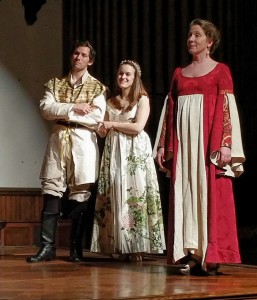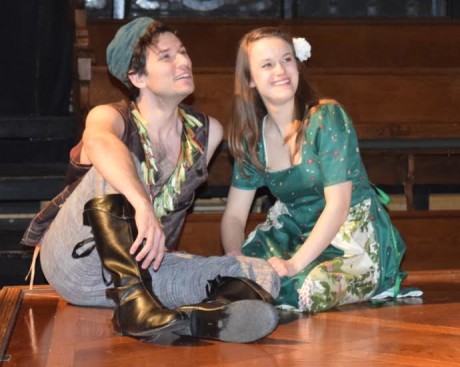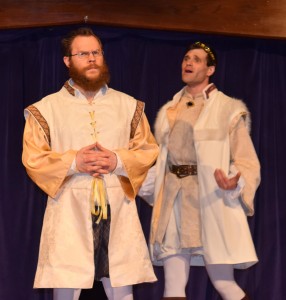Shakespeare presents a language barrier for actors and audience alike. Typically, companies affect British accents (“received pronunciation” – not everyone is a fan), though many companies choose not to adopt any accent at all. Either of which can sound strange depending on what the audience is expecting and requires some getting used to. Oregon Shakespeare Festival has commissioned straight up translations into modern English to avoid the problem altogether.

Baltimore Shakespeare Factory (BSF), a theatre company dedicated to replicating the form and spirit of the presentation of Shakespeare’s work has taken on The Winter’s Tale, directed wonderfully by James Keegan. with a relative new approach: Original Pronunciation (OP), which requires the actors to adopt an accent that is as close to historically accurate speech as we can be reasonably certain of (that sentence is an eyeful; you can take the boy out of academia …). Changing pronunciation requires a lot of dedicated effort by the cast and it reveals some very different rhythms in the text, which a few members of the company happily demonstrate some of these rhythms for you before the performance.
You still have to keep your ears open and many of the anachronisms still require helpful blocking, but your relationship to the text changes quite a bit. The company of The Winter’s Tale are in for a pound of OP and it is quite an experience, especially in the moody confines of the Great Hall at St. Mary’s on Roland near Johns Hopkins. The room reeks of history and the floors creak under the weight of the years. One thing old chapels and churches were designed to do was convey the human voice without artificial amplification (I mean, other than the architectural cheats), so you won’t have any trouble hearing familiar words in unfamiliar ways.
Before we dig into The Winter’s Tale proper, it’s important to calibrate your expectations of the performance. Baltimore Shakespeare Factory takes a holistic approach to re-creating the old theater experience (you can find it all laid out in detail here). For one thing, BSF actively engages their audience before and during the show. Autolicus (an incredibly game Jess Behar) gives you the hard sell on some raffle tickets while the company serenades you with covers of thematically relevant pop songs (Cat Stevens’ “Wild World” felt very appropriate).

Autolicus is not shy about soliciting your applause during the show either (play along, it’s worth it). It’s no fun to call on the audience if you don’t leave the lights up on the house. In fact, there aren’t any lighting cues at all (that hurts – I’m a lighting guy. Aside: I sincerely wish some kind donor would gift the Great Hall some LEDs to replace those space heaters we called “lights” 40 years ago). Their approach to cross-gender casting is delightfully 21st century: boys used to be girls, so girls can be boys, NBD (but do keep up – gender is as fluid as the next quick change). BSF’s refreshment game is strong as well. There’s beer (if you sit in the front row, someone might steal a sip) In a church!
One design area that BSF does not abjure is costume design. Costume Designer, April Forrer, (also the Managing Director, a rather uncommon hyphen in my experience) has done great work here with some well-designed (the saintly Paulina and the pure Hermione in crisp white and the shepherds and pastorals in a delightful range of greens and browns) and well-executed costumes.
But the play’s the thing and we should talk turkey. The Winter’s Tale is a lumpy play. It is front loaded with high tragedy, as Leontes (Chris Cotterman) succumbs to the disease of jealousy with the speed of an Ebola victim, a spiritual sickness that quickly results in the death and banishment of nearly everyone of worth in his court, despite the assurance of the gods in Delphos (though we are in Sicilia – just don’t think about it) that sweet Hermione is as faithful as she is gentle.
Valerie Dowdle stands out as Hermione in the difficult first part, flashing some range, grace, and class as the wronged Hermione trying to prove her love to her suddenly suspicious husband. When she learns of her son’s death, she swoons, to death according to Paulina (Marianne Gazzola Angelella) and the play can move on to the shores of Bohemia (sigh, yeah, The Winter’s Tale, man). The first part of the production ends with a chorus of ghosts in white masks pantomiming Antigonus’ (David Forrer) description of his agonized dream about the ghost of Hermione and the storm that ran their ship aground before being torn apart by that infamous stage direction, I mean bear. A chorus of ghosts transform, Voltron-style (that’s a compliment), into that murderous bear.
To their great credit, BSF eases the pain of the first act with a fun pre-show and an intermission that shares the same lighthearted musical flavor (“Torn,” that late 90s hit from Aussie Natalie Imbruglia feels particularly cheeky after a character is literally torn apart).
A signed poster is handed out, songs are song and then Time, the gardener, sets the scene as 16 years later and we are suddenly in a pun-tastic pastoral comedy with only occasional dark clouds to trouble us. The production’s mood lightens considerably during Autolicus’ hijinks. The company moves into a higher gear, and they really shine when Shakespeare sets his characters dancing, singing, wooing, and getting their purses stolen. Kathryn Zoerb is fetching as the teenage Perdita and Brendan Edward Kennedy shines as Florizel, the lordly youth gone undercover, smitten by the noble shepherdess.
Shakespeare never could resist tying up any and all loose ends that happen to be around, so after we spend a good time singing with our young lovers and watching the Clown, played nimbly and lithely by Rena Marie, get thoroughly schooled out of his (their?) money by Autolicus, our play ships off back to Sicilia and a dour, chastened Leontes.

In one of Shakespeare’s most perverse denouements, the climactic events that we have been primed for, the reconciliation of Leontes and Philoxenes, the rejoicing of the lovers, and Perdita’s true parentage, happen off-stage. We only learn of it from a troupe of fools, including a playful bit of double casting where the actor who played Antigonus (David Forrer, you lucky duck) gets to shudder over that sad man’s fate. And then we move from the court to Paulina’s cottage and the statue so real that it looks alive. Shakespeare’s time was still imbued with medieval magical thinking, so Paulina has to assure us that she is not a witch and her magic is pure, though we suspect she is just a shrewd woman who knew that Leontes would regret his action and lived her magic trick for 16 years until just the right moment (Paulina would fit right into the world of The Prestige). As Shakespeare fans know, the play ends with a joyful kiss between Leontes and Hermione and the cast breaking into a popular song made famous by “The Fab Four’ and takes a well-earned bow or two.
In all, it was a wonderful evening in a fun little theatre space (though I was mildly terrified by the visible deflection of the ancient wood floor during some enthusiastic full cast dance numbers). The only thing I am wondering now is if the house band takes cover requests. Would it be too much of a spoiler to finish intermission with a cover of “Mama, I’m Coming Home?” You’re right. It’s just fine as it is.
Running Time: Approximate Two hours and 30 minutes, plus an intermission.
The Winter’s Tale plays on weekends through April 24, 2016, at Baltimore Shakespeare Factory, performing at The Great Hall at St. Mary’s -3900 Roland Avenue, in Baltimore, MD. For tickets, purchase them online.
RATING:




